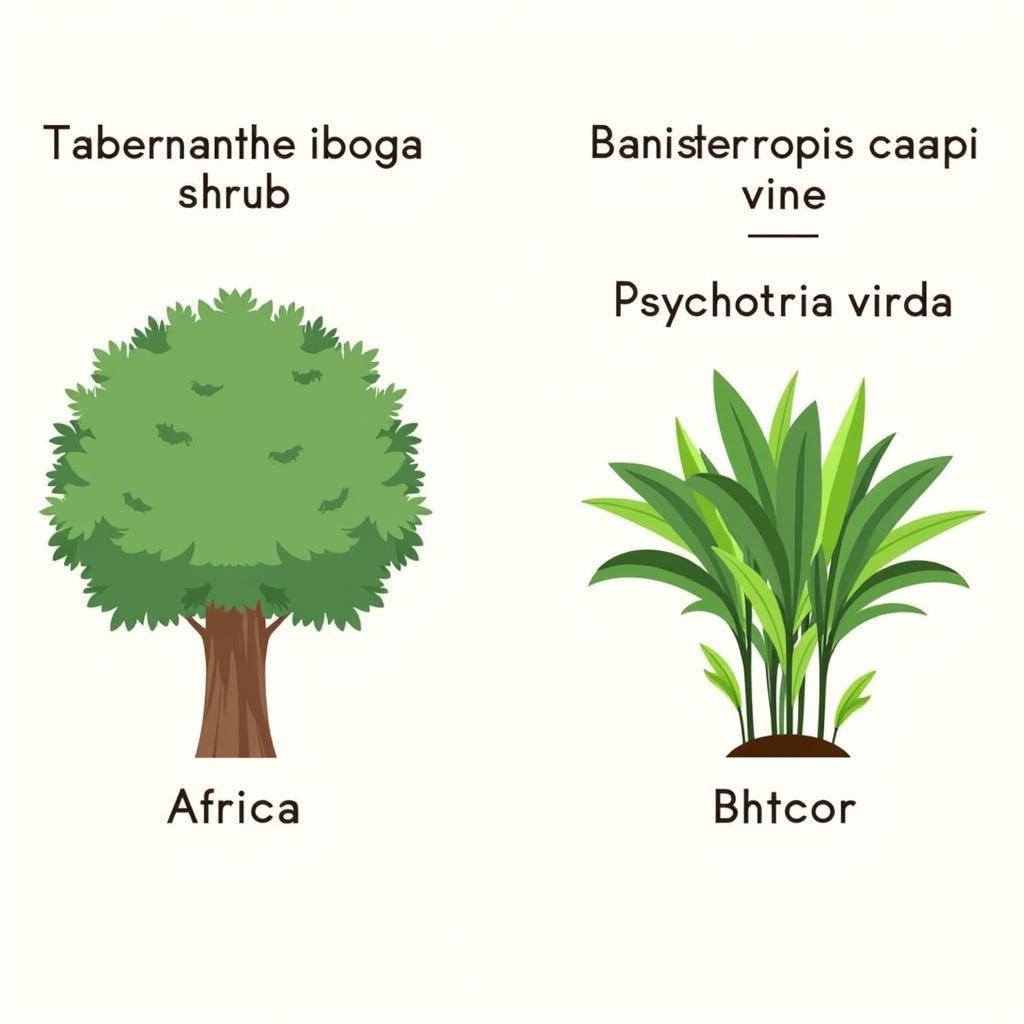Ibogaine and ayahuasca are two powerful plant medicines gaining increasing attention for their potential therapeutic uses. While both substances can induce altered states of consciousness, they differ significantly in their origins, chemical makeup, effects, and potential risks. This article will explore the key distinctions between ibogaine and ayahuasca to help you understand their unique properties and potential applications.
Chemical Composition and Origins: A Tale of Two Plants
Ibogaine is derived from the root bark of the Tabernanthe iboga shrub, native to West Central Africa. Its primary active alkaloid, ibogaine, acts on various neurotransmitter systems, including serotonin, dopamine, and opioid receptors. This interaction is thought to be responsible for its potential in treating addiction.
Ayahuasca, on the other hand, is a brew traditionally made from the Banisteriopsis caapi vine and the Psychotria viridis shrub, found in the Amazon basin. The combination of these plants is crucial, as B. caapi contains MAO inhibitors that allow the psychoactive compound DMT in P. viridis to be orally active. Ayahuasca primarily affects serotonin receptors, leading to profound visual and emotional experiences.
 Iboga and Ayahuasca Origins
Iboga and Ayahuasca Origins
Effects and Experiences: A Journey Inward
Both ibogaine and ayahuasca can induce intense altered states of consciousness, but their effects differ significantly. Ibogaine experiences are often described as introspective and analytical, with a focus on past memories and emotional processing. Users often report a reduction in drug cravings and a clearer understanding of their addictive behaviors.
Ayahuasca, conversely, is known for its vivid visions, emotional catharsis, and spiritual insights. Users often describe encounters with mystical entities, profound emotional healing, and a sense of interconnectedness.
Potential Risks and Safety Considerations: Navigating the Terrain
Both ibogaine and ayahuasca carry potential risks and should only be used under the guidance of experienced practitioners. Ibogaine can cause cardiac complications and should be avoided by individuals with pre-existing heart conditions. Ayahuasca can interact with certain medications, including antidepressants, and can exacerbate underlying mental health issues.
Thorough screening and medical supervision are essential for both substances. Furthermore, the setting and intention play a crucial role in the safety and efficacy of these experiences. A supportive and safe environment is paramount for navigating the intense emotional and psychological processes that can arise.
Therapeutic Potential: A Path to Healing
Both ibogaine and ayahuasca have shown promise in treating various conditions. Ibogaine has been investigated for its potential in treating opioid, stimulant, and alcohol addiction. Ayahuasca has shown potential in treating depression, anxiety, and PTSD.
While research is ongoing, preliminary findings suggest that these plant medicines may offer unique therapeutic benefits. However, more rigorous clinical trials are needed to fully understand their efficacy and safety.
Conclusion: Choosing the Right Path
Ibogaine and ayahuasca are distinct plant medicines with unique properties and potential applications. Understanding their differences is crucial for making informed decisions about their use. While both offer potential pathways to healing, careful consideration of individual needs, risks, and intentions is essential. Ibogaine and ayahuasca are powerful tools that should be approached with respect and caution.
FAQ
- What is the difference between ibogaine and ayahuasca?
- Are ibogaine and ayahuasca legal?
- What are the risks of using ibogaine and ayahuasca?
- How do I find a qualified practitioner?
- What should I expect during an ibogaine or ayahuasca ceremony?
- Can ibogaine and ayahuasca cure addiction?
- What is the cost of ibogaine and ayahuasca treatment?
Nếu bạn cần hỗ trợ hãy liên hệ Số Điện Thoại: 0909802228, Email: [email protected] Hoặc đến địa chỉ: 101 Đ. Lý Chiêu Hoàng, Phường 10, Quận 6, Hồ Chí Minh, Việt Nam. Chúng tôi có đội ngũ chăm sóc khách hàng 24/7.